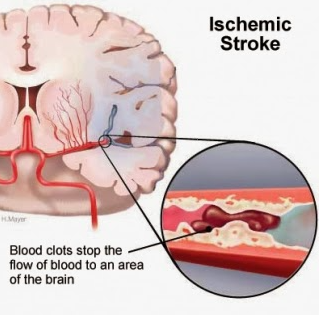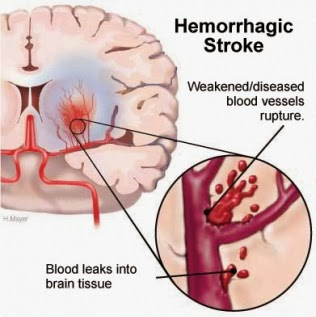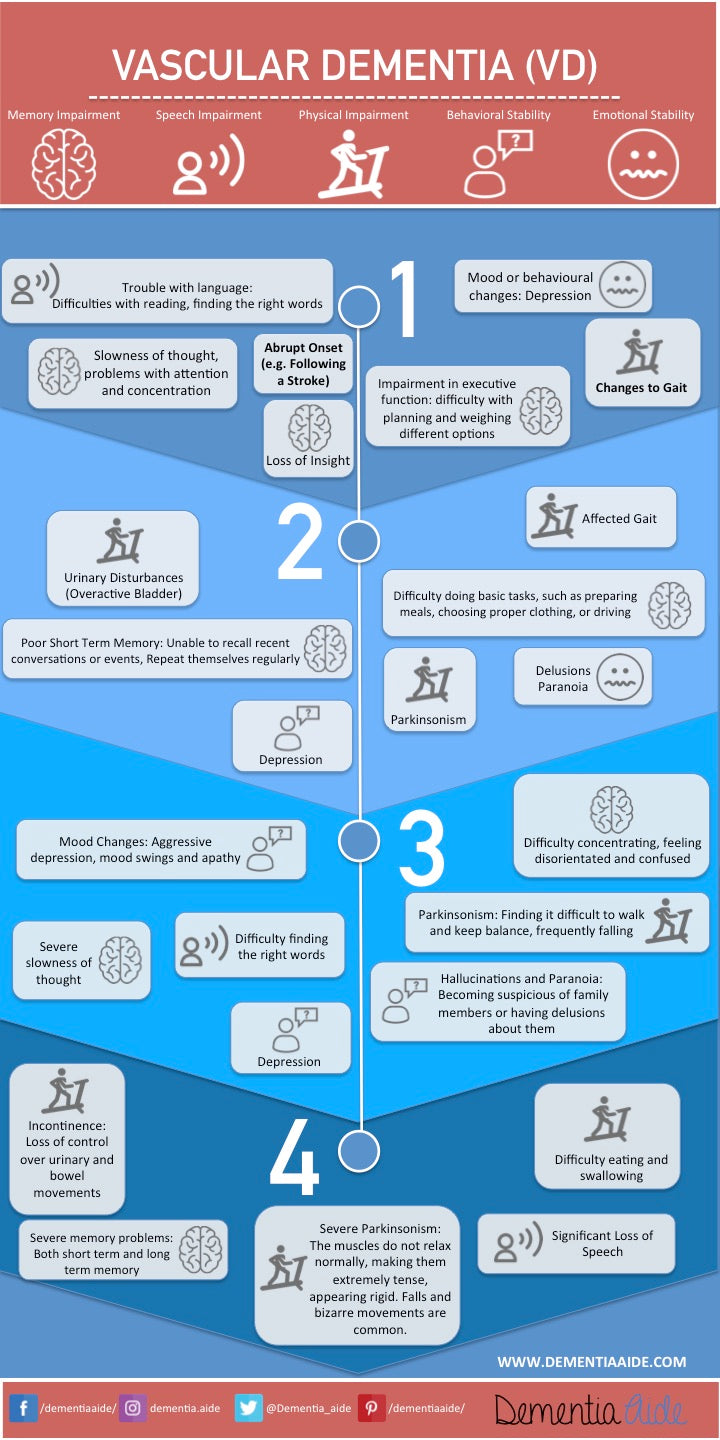Dementia is known to be a chronic disorder of the mental processes and is caused by brain disease or injury. It is marked by memory disorders, personality changes, and impaired reasoning, to name a few. In general, most people have at least some idea of what dementia is. However, what many do not know is that there are several types of dementia that can affect people, each with its own causes, symptoms, and diagnoses. After Alzheimer’s disease, Vascular Dementia (VA) is known to be most common type of dementia known.
TOPICS COVERED – QUICK LINKS:
- UNDERSTANDING THE BASICS OF VASCULAR DEMENTIA
- HOW DOES IT HAPPEN?
- THE DIFFERENT TYPES OF VASCULAR DEMENTIA
- WHO IS MOST AT RISK?
- WHAT ARE THE SYMPTOMS OF THE CONDITION?
- HOW TO DIAGNOSE VASCULAR DEMENTIA?
- HOW TO TREAT VASCULAR DEMENTIA?
- CHALLENGES OF CARING FOR VASCULAR DEMENTIA PATIENTS & CARE ARRANGEMENTS AVAILABLE
- RESEARCH & CLINICAL TRIALS FOR VASCULAR DEMENTIA
- RESOURCES AND SUPPORT FOR VASCULAR DEMENTIA
- IN THE NEWS - VASCULAR DEMENTIA
UNDERSTANDING THE BASICS OF VASCULAR DEMENTIA
Vascular dementia is the subtle progressive worsening of memory and other cognitive functions that can be attributed to vascular disease within the brain. In people with this condition, symptoms of dementia, such as memory loss and difficulty with thinking, language, and problem solving, occur due to brain damage caused by blood supply problems in the brain. The problems could be a block or lack of blood flow to the brain. Reduced blood flow in turn, deprives the brain of oxygen. Together, it can cause brain damage, even in a short period of time.
Also known as vascular cognitive impairment, the condition accounts for an estimated 10% of dementia cases, although, many experts believe that it is underdiagnosed. As with dementia in general, people above the age of 65 are at a higher risk of being diagnosed.
In the News: Vascular Dementia (VD)
Back to the Section ListHOW DOES IT HAPPEN?
Vascular dementia is caused by reduced blood flow to the brain, which damages and eventually kills brain cells. This can happen due to a number of reasons such as the narrowing of small blood vessels deep inside the brain, aneurism, a stroke, or several mini-strokes. Sometimes, the damage could also be due to Alzheimer’s. In such cases, it is known as mixed dementia.
 |
 |
More Information:
In the News: Causes of Vascular Dementia
In the News: Prevention
Back to the Section ListTHE DIFFERENT TYPES OF VASCULAR DEMENTIA
Within the realm of vascular dementia itself, there are several different types identified. Two of the most common are Multi-infarct dementia and Binswanger’s disease. Below is a brief overview on both:
Multi-infarct Dementia
Binswanger’s Disease
WHO IS MOST AT RISK?
As vascular dementia is caused by brain damage due to lack of proper blood and oxygen supply to the brain, there are a number of risk factors that can affect the likelihood of being diagnosed. Many of these factors also influence a person’s overall health. Below is a list of common risk factors:
- High blood pressure—hypertension accounts for nearly half of the vascular dementia cases diagnosed. It can cause Binswanger’s Disease.
- Diabetes
- High cholesterol—can cause blockages in the arteries and end up obstructing blood flow to the brain.
- Smoking
One big way to reduce the risk of illnesses that could cause vascular dementia, it is important to lead a healthy lifestyle through proper diet, exercise, and abstinence from smoking.
More Information:
In the News: Detection & Diagnosis
Back to the Section ListWHAT ARE THE SYMPTOMS OF THE CONDITION?
Symptoms of vascular dementia can often overlap with symptoms of Alzheimer’s, but is largely dependent on the location of impaired blood flow within the brain. It is easiest to identify the symptoms when it occurs after a stroke. In cases where the patient suffers multiple strokes or mini strokes, the progression of the symptoms tend to be more stepwise, abrupt and noticeable rather than the steady decline you find in other cases of dementia. As is the case with all types of dementia, the progress of vascular dementia on each individual is different. However, it only worsens over time. The many signs of vascular dementia can be divided into three categories: mental & emotional, physical, and behavioral.
Stage 4: Late Stages
In the News: Symptoms
HOW TO DIAGNOSE VASCULAR DEMENTIA?
In the event that you have a family member or friend exhibiting mild symptoms and you suspect that could have vascular dementia, it is important to immediately have them consult a physician. The earlier it is diagnosed, the better the chances of limiting the progression of the symptoms and allowing the person to lead a normal life for a longer time.
While there are no ways to confirm it, brain scans such as CT scan, MRI or carotid ultrasound can be helpful in the diagnosis as it allows doctors to look for changes in blood vessels and identify clots. There are also some neuropsychological tests that doctors can conduct in order to look for any signs. Sometimes, possible cases of vascular dementia can even be predicted when a person suffers from stroke or an illness borne from risks listed above.
More Information:
In the News: Detection & Diagnosis
Back to the Section ListHOW TO TREAT VASCULAR DEMENTIA?
Being a progressive disease, there is no cure for vascular dementia. However, there are several treatments available to control the speed of progression and allow patients to go through their daily lives more normally. For example, if detected early enough, the brain damage caused by blood vessel changes and blockages can be halted with lifestyle changes such as maintaining a proper diet and exercise regime.
There are also drug therapies available to treat the underlying conditions that lead to vascular dementia. These include anticoagulants, blood thinners, and other blood pressure medications. Rehabilitative therapies for speech and physical movement will also help to regain as much lost function as possible. For the patients themselves, psychological counseling, both individual and group therapies, are extremely important in order to cope emotionally with their diagnoses and motivate themselves to delaying their deterioration for as long as possible.
More Information:
In the News: Treatment
Back to the Section ListCHALLENGES OF CARING FOR VASCULAR DEMENTIA PATIENTS & CARE ARRANGEMENTS AVAILABLE
As is the case with all dementias, caring for patients with vascular dementia will be challenging as the disease progresses.
RESEARCH & CLINICAL TRIALS FOR VASCULAR DEMENTIA
As is the case in almost any facet of the medical field, there is constant research and development being done with regards to vascular dementia. The following is a list of types of clinical trials that are being done:
- Treatment trials—to find more effective blood thinners, anticoagulants, and any drug that can reduce the risk of blood clots and strokes.
- Diagnostic studies—to find new tests and methods to diagnose vascular dementia earlier and more accurately.
- Prevention trials—to explore various means of preventing the formation of blood clots and resulting strokes.
- Quality of life studies—to explore ways to improve the quality of life for patients and caregivers at different stages of the illness’s progression.
More Information:
In the News: Research
Back to the Section ListRESOURCES AND SUPPORT FOR VASCULAR DEMENTIA
For family members and friends who would like to educate themselves further on the details of vascular dementia, its symptoms, treatments, and challenges, you should seek the assistance of local or national Dementia or Alzheimer’s Association.
Other websites to obtain more information on vascular dementia:
IN THE NEWS - VASCULAR DEMENTIA:
Click the following links for News Articles on Vascular Dementia (VD)


